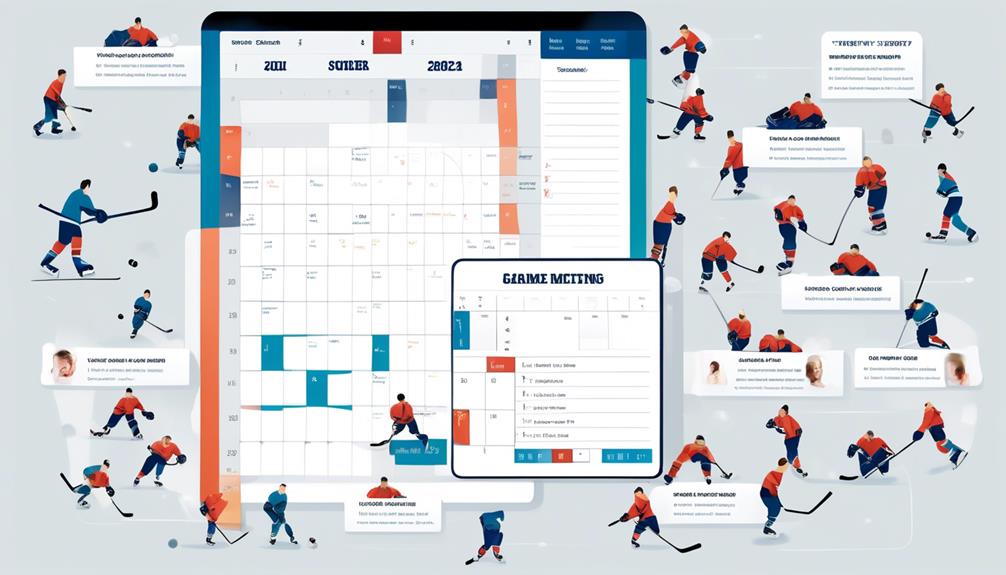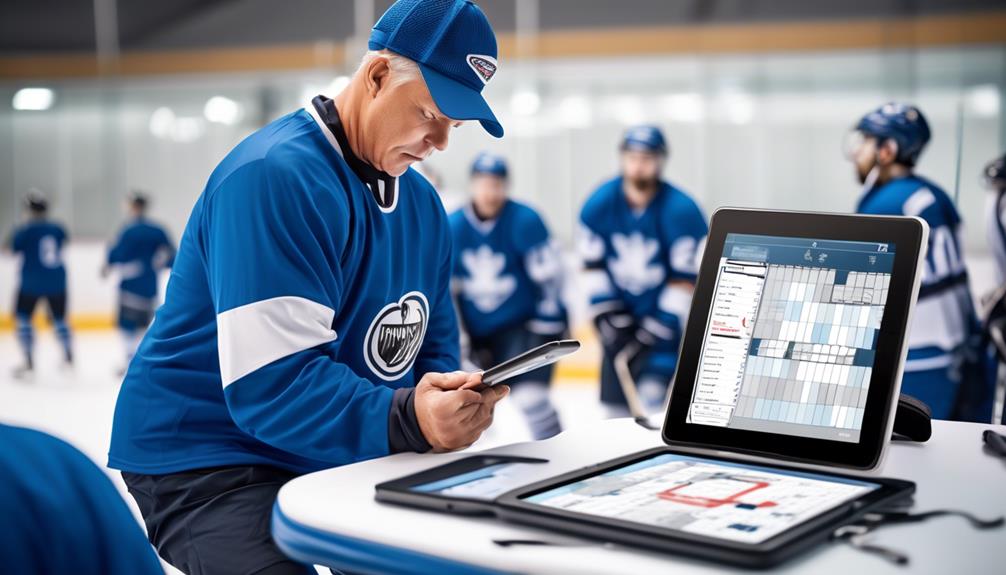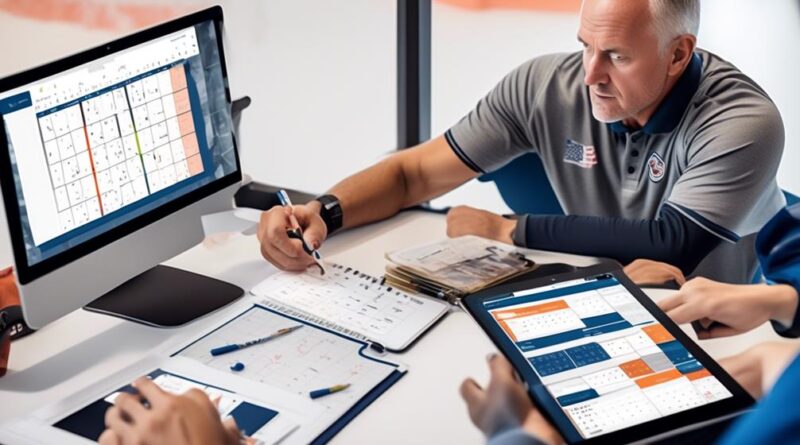Optimizing Hockey Coaching Time Management Strategies
As a hockey coach, you know that time is your most valuable asset on and off the ice. Just like a well-oiled machine, your coaching strategies need to be finely tuned to maximize efficiency and effectiveness.
From practice planning to game preparation, optimizing your time management strategies can make a significant impact on your team's performance. But how exactly can you streamline your coaching processes to get the most out of every minute?
Setting Clear Priorities

To effectively manage your time as a hockey coach, it's essential to clearly establish your coaching priorities. Time allocation is crucial for a coach, and setting clear priorities allows you to determine where to focus your time and energy.
Start by identifying the most critical aspects of your coaching responsibilities. This might include planning and running effective practices, analyzing game footage, or developing individual player skills. Once you have a clear understanding of your priorities, you can allocate your time accordingly.
For example, if you know that developing individual player skills is a top priority, you can schedule specific time slots for skill-building activities during practices.
Task delegation is another important aspect of setting clear priorities. As a coach, you might feel the need to handle every aspect of your team's development, but it's important to recognize when and how to delegate tasks.
This could involve assigning assistant coaches or other staff members to take on specific responsibilities, such as leading warm-up drills or organizing team logistics. Delegating tasks not only frees up your time to focus on higher-priority activities but also allows others to contribute to the team's success.
Efficient Practice Planning
As you focus on efficient practice planning, pivoting from setting clear priorities, consider the key areas where your players can benefit the most from targeted skill development and strategic drills.
To maximize practice efficiency and player engagement, it's crucial to allocate time effectively and structure your sessions to optimize skill development. Here are some key areas to consider:
- Time Allocation:
- Allocate specific time slots for different skills and drills to ensure a balanced focus on various aspects of the game. For example, dedicate a block of time for skating drills, another for passing and shooting, and also include time for tactical team plays. This approach ensures that all essential skills receive adequate attention while maintaining player engagement.
- Skill Development:
- Incorporate drills that focus on both individual skill development and team strategies. Include high-intensity drills that challenge players to improve their skills under pressure, as well as situational drills that simulate game scenarios. By incorporating a variety of skill development exercises, players can continuously enhance their abilities while staying engaged and motivated.
Player Development Focus
You can enhance player development focus by implementing targeted training programs that address individual strengths and weaknesses. By tailoring training sessions to focus on individual skill development, you can ensure that each player has the opportunity to improve in areas where they may need additional support. Utilizing drills and exercises that specifically target these areas can be highly effective in maximizing player development.
Additionally, incorporating team building activities into your coaching plan can foster a cohesive and supportive team environment, which is essential for overall player development.
When designing training programs, consider each player's unique strengths and weaknesses. This individualized approach can help players maximize their potential and contribute more effectively to the team. By providing targeted coaching that addresses specific skill gaps, players can make significant strides in their development.
Furthermore, integrating team building exercises into your coaching regimen can strengthen relationships among players and create a supportive team culture. This, in turn, can boost morale and motivation, leading to improved performance on the ice.
Utilizing Assistant Coaches Effectively
Effectively utilizing assistant coaches involves delegating specific responsibilities and empowering them to contribute to the team's overall success. To ensure that your coaching staff is utilized to its full potential, consider the following strategies:
- Task Delegation: Assign specific areas of focus to each assistant coach, such as offense, defense, special teams, or player development. This allows them to specialize in their assigned areas, leading to a more comprehensive and effective coaching approach.
- *Teamwork Dynamics*: Encourage collaboration among assistant coaches to create cohesive strategies that align with the team's overall goals. By fostering an environment of teamwork and open communication, you can maximize the collective expertise of your coaching staff.
- Leadership Guidance: Provide your assistant coaches with opportunities to take on leadership roles, such as leading specific drills or providing feedback to players. This not only empowers them but also allows them to develop their coaching skills through hands-on experience.
- *Mentorship Approach*: Support your assistant coaches in their professional development by offering mentorship and guidance. By investing in their growth and providing constructive feedback, you can cultivate a strong coaching team that's dedicated to continuous improvement.
Game Preparation Strategies
Empower your coaching staff by applying efficient game preparation strategies that build upon their designated areas of focus and collaborative teamwork dynamics. Prior to each game, it's crucial to establish effective pre-game routines that help players mentally and physically prepare for the upcoming match. These routines can include specific warm-up drills, team meetings to discuss game tactics, and individual player preparations. By implementing structured pre-game routines, you can ensure that your team is mentally focused and physically ready to perform at their best.
In addition to pre-game routines, video analysis is an essential tool for game preparation. Utilizing video analysis allows your coaching staff to dissect the strengths and weaknesses of both your team and the upcoming opponent. This in-depth analysis provides valuable insights that can be used to develop strategic game plans and make informed decisions regarding line formations, defensive strategies, and offensive plays.
Moreover, video analysis can be used to provide constructive feedback to players, helping them understand their performance and areas for improvement.
Effective Team Communication
When fostering effective team communication, it's crucial to establish clear channels for sharing information and facilitating open dialogue among players and coaching staff. This is essential for creating a cohesive and successful team.
To achieve this, consider the following key elements:
- Active Listening: Encourage active listening among team members. This involves fully concentrating, understanding, responding, and remembering what's being said. By actively listening to teammates and coaching staff, players can better understand expectations, strategies, and constructive feedback.
- Engage with empathy: Encourage players to listen with empathy, understanding the emotions and perspectives behind the words spoken. This can foster a deeper connection and trust within the team.
- Constructive Feedback: Establish a culture of providing and receiving constructive feedback. This means offering feedback that's specific, actionable, and focused on improvement. When players feel comfortable giving and receiving constructive feedback, it enhances their individual and collective performance.
Utilizing Technology for Time Management

To maximize efficiency in your coaching schedule, consider integrating modern time management tools and applications tailored to the specific needs of your team. Technology integration plays a crucial role in streamlining your coaching responsibilities. Utilizing time-saving tools such as scheduling software, communication platforms, and performance analysis applications can significantly enhance your productivity and allow you to focus more on coaching and developing your team.
Time-saving tools like scheduling software can help you efficiently plan and organize practices, meetings, and individual player development sessions. These applications allow you to coordinate with your coaching staff and players, ensuring everyone is on the same page and informed about upcoming events.
Additionally, communication platforms such as team messaging apps or video conferencing tools enable seamless interaction and quick dissemination of important information, reducing time spent on coordinating through traditional means like phone calls or emails.
Furthermore, performance analysis applications provide valuable insights into your team's strengths, weaknesses, and areas for improvement. By leveraging these tools, you can efficiently review game footage, analyze player performance, and strategize effectively, ultimately saving time and enhancing the quality of your coaching.
Incorporating technology for time management not only optimizes your coaching schedule but also fosters a more organized and productive environment for your team. Embracing these time-saving tools empowers you to allocate your time and energy where it matters most – guiding and developing your players to achieve their full potential.
Assessing and Adjusting Strategies
Integrating modern time management tools and applications in your coaching schedule is essential for maximizing efficiency. Now, it's crucial to assess and adjust your strategies to ensure continued improvement.
To effectively assess and adjust your coaching time management strategies, consider the following:
- Evaluation Techniques
- Implement regular evaluations of your time management strategies to identify areas for improvement.
- Use performance metrics such as practice attendance, player development, and game outcomes to measure the effectiveness of your time allocation.
- Time Allocation
- Analyze the time allocated to various coaching tasks such as team practice, individual player development, game preparation, and administrative responsibilities.
- Prioritize tasks based on their impact on overall team performance and make necessary adjustments to optimize time allocation.
Being flexible and open to adaptation is key in this process. Flexibility allows you to make timely adjustments based on the evaluation techniques employed. It's essential to adapt to the changing needs of your team, the dynamics of the game, and external factors such as scheduling changes.
Frequently Asked Questions
How Can Coaches Balance Their Time Between On-Ice and Off-Ice Player Development Activities?
To balance your time between on-ice and off-ice player development activities, prioritize on-ice focus for skill-building and game strategies, then allocate specific off-ice training for physical conditioning and mental preparation. Engage players in both settings for optimal development.
What Are Some Effective Ways to Handle Unexpected Changes in the Practice Schedule or Game Day Lineup?
When handling disruptions, stay adaptable and communicate clearly with players and staff. Be ready to make game day adjustments by having contingency plans in place for practice and lineup changes. Flexibility and preparation are key.
How Can Coaches Best Support and Develop Players With Different Skill Levels and Learning Styles?
To best support and develop players with different skill levels and learning styles, provide individualized feedback and tailor practice modifications. Use learning assessments to inform your approach and ensure skill progression for each player.
What Are Some Strategies for Ensuring That Assistant Coaches Are Effectively Utilized and Supported in Their Roles?
To ensure assistant coaches are effectively utilized and supported, focus on leadership development and communication strategies. Implement team building and performance evaluation activities. Encourage open dialogue and collaboration to maximize coaching resources and enhance player development.
How Can Coaches Effectively Manage Their Time During High-Pressure Game Situations to Make Quick Decisions and Adjustments?
When it's game time, making quick decisions and adjustments is crucial. Manage your time under pressure by prioritizing tasks, staying focused, and trusting your instincts. Stay organized and communicate efficiently to ensure effective coaching during high-pressure situations.
Conclusion
In conclusion, by setting clear priorities, efficiently planning practices, and focusing on player development, you can optimize your hockey coaching time management strategies.
Utilizing assistant coaches effectively, preparing for games, and communicating effectively are also important aspects of effective time management in coaching.
Additionally, using technology for time management can be a valuable tool.
Remember to assess and adjust your strategies as needed to ensure you're making the most of your coaching time and helping your team reach their full potential.
Keep up the great work!
